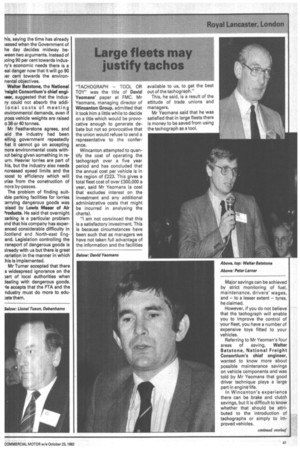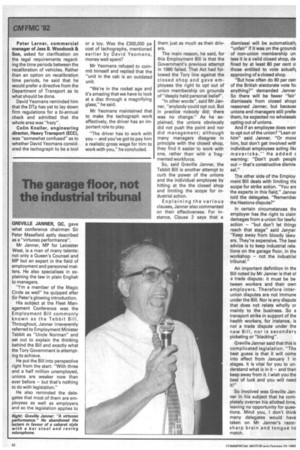"TACHOGRAPH — TOOL OR TOY" was the title of David
Page 27

Page 28

If you've noticed an error in this article please click here to report it so we can fix it.
Yeomans' paper at FMC. Mr Yeomans, managing director of Wincanton Group, admitted that it took him a little while to decide on a title which would be provocative enough to generate debate but not so provocative that the union would refuse to send a representative to the conference.
Wincanton attempted to quantify the cost of operating the tachograph over a five year period and has concluded that the annual cost per vehicle is in the region of £223. This gives a total fleet cost of over £300,000 a year, said Mr Yeomans (a cost that excludes interest on the investment and any additional administrative costs that might be incurred in analysing the charts).
"I am not convinced that this is a satisfactory investment. This is because circumstances have been such that as managers we have not taken full advantage of the information and the facilities available to us, to get the best out of the tachograph."
This, he said, is a result of the attitude of trade unions and managers.
Mr Yeomans said that he was satisfied that in large fleets there is money to be saved from using the tachograph as a tool. Major savings can be achieved by strict monitoring of fuel, maintenance, drivers' wages, and — to a lesser extent — tyres, he claimed.
However, if you do not believe that the tachograph will enable you to improve the control of your fleet, you have a number of expensive toys fitted to your vehicles.
Referring to Mr Yeoman's four areas of saving, Walter Batstone, National Freight Consortium's chief engineer, wanted to know more about possible maintenance savings on vehicle components and was told by Mr Yeomans that good driver technique plays a large part in engintrlife.
In Wincanton's experience there can be brake and clutch savings, but it is difficult to know whether that should be attributed to the introduction of tachographs or simply to improved vehicles. Peter Lerner, commercial manager of Jess B. Woodcock & Son, asked for clarification on the legal requirements regarding the time periods between the recalibration of vehicles. Rather than an option on recalibration time periods, he said that he would prefer a directive from the Department of Transport as to what should be done.
David Yeomans reminded him that the DTp has yet to lay down firm regulations for a bi-annual check and admitted that the whole area was "hazy".
Colin Kneller, engineering director, Heavy Transport (ECC), was "somewhat confused" as to whether David Yeomans considered the tachograph to be a tool or a toy. Was the £300,000 pa cost of tachographs, mentioned earlier by David Yeomans, money well spent?
Mr Yeomans refused to commit himself and replied that the "unit in the cab is an outdated unit.
"We're in the rocket age and it's amazing that we have to look at a disc through a magnifying glass," he said.
Mr Yeomans maintained that to make the tachograph work effectively, the driver has an important role to play.
"The driver has to work with you — and you've got to pay him a realistic gross wage for him to work with you," he concluded.


















































































































